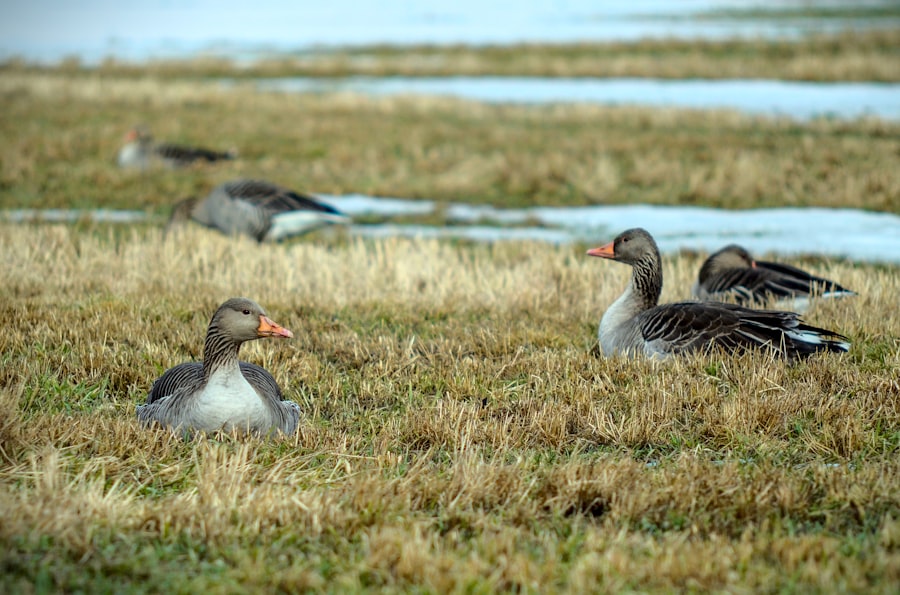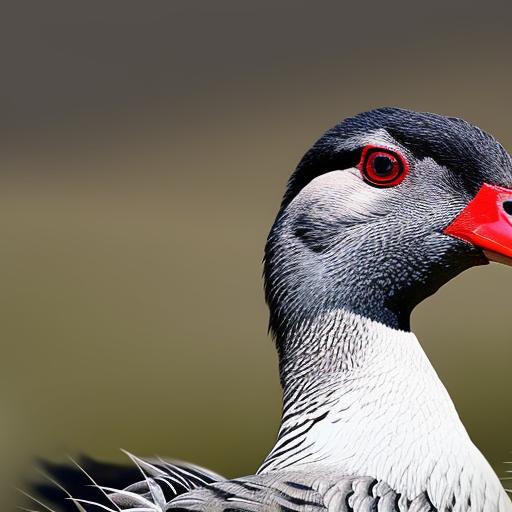Geese have been domesticated for thousands of years and have played a significant role in agriculture throughout history. They were first domesticated in ancient Egypt and were later introduced to Europe and other parts of the world. Today, geese are still a popular choice for farmers due to their many benefits.
Geese are a great addition to any farm for several reasons. Firstly, they are excellent foragers and can help control weeds and pests in the fields. They also produce high-quality meat and eggs that are nutritious and delicious. Additionally, geese are hardy animals that can adapt to various climates and require minimal care compared to other livestock.
Key Takeaways
- Keeping geese on the farm can provide a sustainable source of meat and eggs.
- Choosing the right breed of geese for your farm depends on your goals and climate.
- A suitable habitat for geese includes access to water, shelter, and protection from predators.
- Feeding and watering geese requires a balanced diet and clean water sources.
- Caring for geese during breeding season involves providing nesting areas and monitoring for any health issues.
Benefits of raising geese for meat and eggs
Geese meat is known for its rich flavor and tender texture. It is also highly nutritious, being a good source of protein, iron, and vitamins. Goose eggs are larger than chicken eggs and have a higher yolk-to-white ratio, making them ideal for baking and cooking. They are also rich in nutrients such as vitamin B12, vitamin D, and omega-3 fatty acids.
Raising geese can also be cost-effective compared to other livestock. Geese are efficient converters of feed into meat and eggs, meaning they require less feed to produce the same amount of meat or eggs as other animals. They are also hardy animals that can graze on pasture and forage for food, reducing the need for expensive commercial feed.
Choosing the right breed of geese for your farm
There are several popular breeds of geese to choose from, each with its own characteristics and advantages. Some common breeds include Toulouse, Embden, Chinese, and African geese.
Toulouse geese are known for their large size and excellent meat quality. They have a calm temperament and are easy to handle. Embden geese are also large birds with white feathers and orange bills. They are good layers and produce large eggs. Chinese geese are smaller in size and have a distinctive knob on their bill. They are excellent foragers and are known for their high egg production. African geese are medium-sized birds with a striking appearance. They have a loud honk and are good foragers.
When choosing a breed of geese for your farm, it is important to consider factors such as climate, available space, and your specific goals. Some breeds may be better suited to colder climates, while others may be more adaptable to warmer climates. It is also important to consider the temperament and behavior of the breed, as some may be more aggressive or flighty than others.
Setting up a suitable habitat for your geese
Geese require suitable housing to provide them with a safe and comfortable environment. There are several housing options to choose from, including simple shelters, barns, or fenced-in areas.
Simple shelters can be made from materials such as wood or metal and should provide protection from the elements and predators. They should have adequate ventilation and be easy to clean. Barns can provide more space and protection for larger flocks of geese. Fenced-in areas can be used to allow geese to graze on pasture while still providing them with protection.
It is important to create a safe and comfortable environment for your geese. This includes providing them with clean bedding, fresh water, and access to food. Geese also require access to water for swimming, as this helps keep their feathers clean and healthy.
Feeding and watering your geese for optimal health
Geese have specific nutritional requirements that need to be met for optimal health and productivity. They require a balanced diet that includes grains, greens, and protein sources.
Grains such as corn, wheat, and barley can make up the majority of a goose’s diet. Greens such as grass, clover, and lettuce can be provided as a source of vitamins and minerals. Protein sources such as soybean meal or fish meal can be added to the diet to ensure adequate protein intake.
It is important to provide fresh, clean water for your geese at all times. Geese require a lot of water, especially during hot weather, as they use it for drinking, bathing, and preening. Water should be provided in a shallow container that allows geese to dip their heads and clean their feathers.
Caring for your geese during breeding season

Breeding season in geese typically occurs in the spring. During this time, geese may exhibit certain behaviors and require special care.
Signs of breeding season in geese include increased vocalization, nest building, and mating behavior. Female geese may lay eggs and become protective of their nests. It is important to provide nesting boxes or suitable areas for geese to lay their eggs.
During breeding season, it is important to provide extra care and attention to your geese. This includes ensuring they have access to suitable nesting areas, providing extra feed and water, and monitoring their behavior for any signs of illness or stress.
Protecting your geese from predators and other risks
Geese are vulnerable to predators such as foxes, raccoons, and birds of prey. It is important to take measures to protect your geese from these risks.
One way to protect your geese is by providing them with a secure housing area that is predator-proof. This can include using fencing or netting to keep predators out. It is also important to regularly inspect the housing area for any signs of damage or weakness that could allow predators to enter.
Other measures that can be taken to protect your geese include using scare devices such as noise makers or visual deterrents, keeping the area clean and free of attractants such as food scraps, and providing adequate lighting at night to deter predators.
Managing the waste and cleaning of your geese’s living area
Proper waste management is important for the health and hygiene of your geese. Geese produce a significant amount of waste, which can accumulate and become a breeding ground for bacteria and parasites if not managed properly.
It is important to regularly clean the geese’s living area to remove waste and prevent the buildup of bacteria. This can be done by removing soiled bedding, cleaning water containers, and disinfecting the area as needed.
It is also important to properly dispose of the waste to prevent contamination of the environment. This can be done by composting the waste or using it as fertilizer on non-food crops.
Harvesting and processing geese for meat and eggs
The timing of harvesting geese for meat and eggs depends on your specific goals and the breed of geese you have. Geese can be harvested for meat when they reach a desired weight, typically around 12-16 weeks of age. Eggs can be collected daily once the geese start laying, which usually occurs around 6-8 months of age.
When processing geese for meat, it is important to follow proper food safety guidelines. This includes slaughtering the geese in a humane manner, chilling the carcass quickly to prevent bacterial growth, and properly storing and packaging the meat.
For collecting eggs, it is important to handle them carefully to prevent breakage. Eggs should be cleaned and stored in a cool place until they are ready to be sold or used.
Selling and marketing your geese products to consumers
Finding a market for your geese products can be done through various channels. This can include selling directly to consumers at farmers markets or through a farm stand, selling to local restaurants or grocery stores, or even selling online through a website or social media platforms.
When marketing your geese products, it is important to highlight the unique qualities and benefits of your products. This can include emphasizing the high quality and nutritional value of goose meat and eggs, as well as the sustainable and humane practices used in raising the geese.
It is also important to build relationships with your customers and provide excellent customer service. This can include offering samples of your products, providing recipes and cooking tips, and being responsive to customer inquiries and feedback.
In conclusion, keeping geese on the farm can be a rewarding and profitable venture. By following these tips and guidelines, you can successfully raise geese for meat and eggs while providing them with a safe and comfortable living environment. Geese offer many benefits to farmers, including their ability to control weeds and pests, their high-quality meat and eggs, and their cost-effectiveness compared to other livestock. With proper care and management, geese can be a valuable addition to any farm.
If you’re interested in keeping geese on your farm, you may also want to check out this informative article on poultrywizard.com about the Hannah Montana Chicken Coop. This article provides valuable insights into creating a comfortable and secure coop for your chickens, which can also be adapted for geese. It covers important aspects such as coop design, nest boxes, and predator protection. To learn more about the Hannah Montana Chicken Coop, click here.
FAQs
What are geese?
Geese are waterfowl birds that are commonly found in many parts of the world. They are known for their long necks, webbed feet, and distinctive honking sound.
Why keep geese on the farm?
Geese can be kept on the farm for a variety of reasons, including as a source of meat, eggs, and feathers. They can also be used for weed control and as a natural alarm system.
What do geese eat?
Geese are omnivores and will eat a variety of foods, including grass, grains, insects, and small animals. They should be provided with a balanced diet that includes both commercial feed and fresh greens.
How do you care for geese?
Geese require regular care, including access to clean water, shelter, and a balanced diet. They should also be protected from predators and given regular health check-ups.
What are some common health issues for geese?
Common health issues for geese include respiratory infections, parasites, and injuries from predators or other geese. Regular health check-ups and proper care can help prevent these issues.
Can geese be aggressive?
Geese can be territorial and may become aggressive if they feel threatened or if their nesting area is disturbed. It is important to handle geese with care and to provide them with a safe and secure environment.
What are some tips for raising geese?
Some tips for raising geese include providing them with a balanced diet, regular health check-ups, and a safe and secure environment. It is also important to handle geese with care and to be aware of their territorial nature.
Meet Walter, the feathered-friend fanatic of Florida! Nestled in the sunshine state, Walter struts through life with his feathered companions, clucking his way to happiness. With a coop that’s fancier than a five-star hotel, he’s the Don Juan of the chicken world. When he’s not teaching his hens to do the cha-cha, you’ll find him in a heated debate with his prized rooster, Sir Clucks-a-Lot. Walter’s poultry passion is no yolk; he’s the sunny-side-up guy you never knew you needed in your flock of friends!







